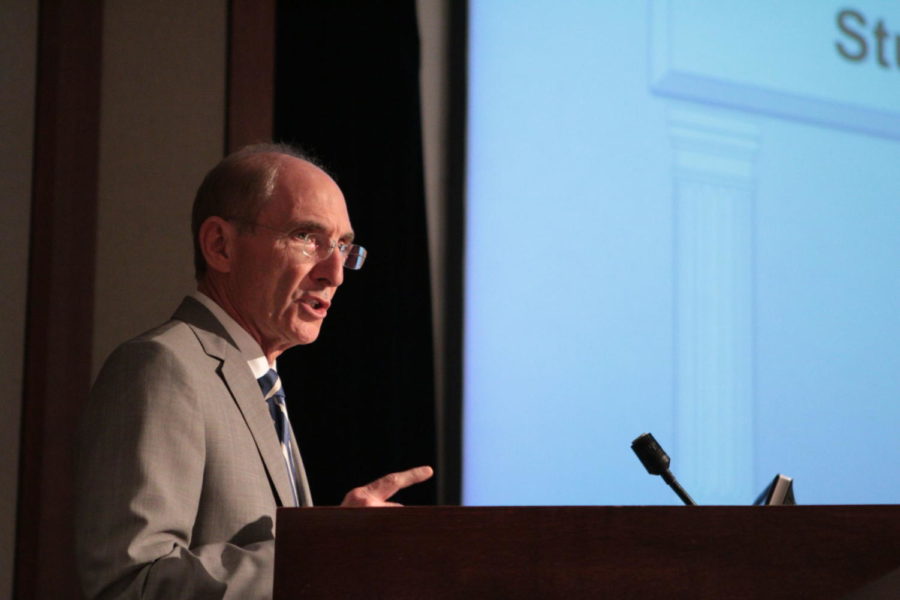UK v. Kernel decision to come this month
President Capilouto reiterated his accusations against the Kernel from the Board of Trustees meeting at the Faculty Senate meeting Monday, Sept. 12.
December 4, 2016
UK’s lawsuit against the Kentucky Kernel will have a decision as early as the end of the month, said Fayette County Circuit Court Judge Thomas Clark, who is presiding over the case.
During the hearing Friday, Clark said he knew the decision was likely to get appealed, but he still wanted to write an opinion on the case, which may end up being his last since he is retiring and this case made it into his courtroom right under the wire.
Lawyers for the university, the Kernel, and two of the survivors mentioned in the Title IX report of former associate professor James Harwood’s sexual misconduct investigation prepared arguments for court.
The university’s attorney, Joshua Salsburey, argued that the Kernel’s request for documents pertaining to the sexual misconduct investigation of Harwood could not be honored because the university would have to violate the Family Educational Rights and Privacy Act.
Salsburey argued that the records in question contain information provided by and about students, and are classified by the university as “education records,” which FERPA prohibits from being released without written consent.
Salsburey said redaction is not sufficient to protect information in the documents that would, “make it possible for the Googlers or the Facebook nerds, whatever you want to call it, to track them down and expose them.”
The Kernel’s attorney Thomas Miller, who is also representing The Lexington Herald-Leader in its suit with UK, said the records in question can be redacted to omit the student’s private and identifying information.
Miller said they are employment records that detail the crucial disciplinary information about how the university’s Title IX department conducted itself in the investigation and how UK disciplines employees found responsible for sexual misconduct.
“The only question is, can the university hide behind its inadequate investigation, behind its failure to disclose to the public that they have a predator that was going to move on to another educational institution?” Miller said.
Miller submitted a letter from Frank LoMonte, Director of the Student Press Law Center, to the court, which said after filing an open records request to the Department of Education, he found no evidence that a university has ever violated FERPA, the penalty of which is forfeit of federal funding.
Miller said that if the judge thought it fit, the Kernel would agree to the redaction of the specific details of the assaults, which has been a point of issue in the university’s briefs and the affidavits of the two Jane Does.
President Eli Capilouto has said in emails to campus that it will continue to oppose the release of these documents to protect the privacy of current survivors and to prevent future survivors from not reporting.
Daniel A. Cohen, the representation for the two Jane Does who filed Amicus Briefs with the court, was barred from becoming a part of the proceedings Friday at the last hearing, but came from Atlanta to try to present more to the court.
Judge Clark denied his request, and let the hearing end with just the arguments from Miller and Salsburey.
































































































































































